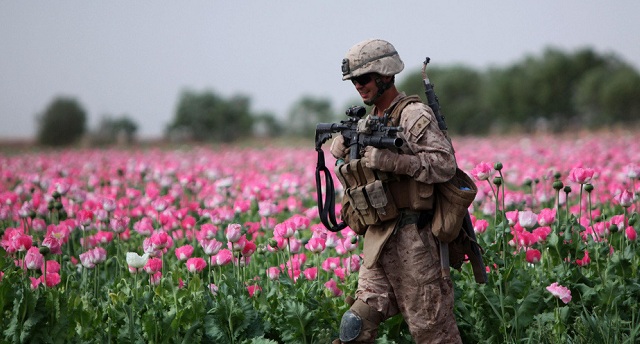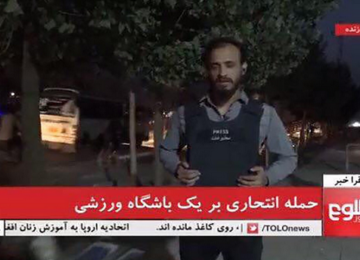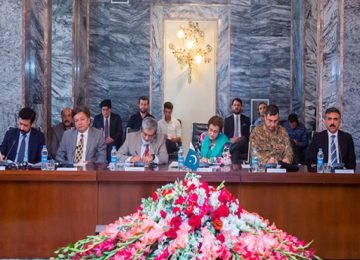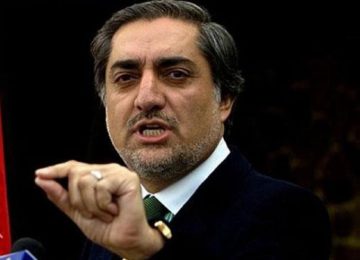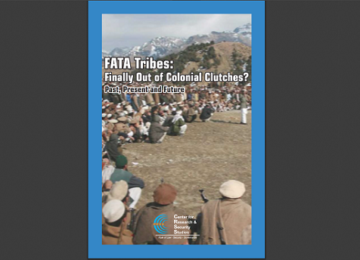“Afghanistan’s multi-billion opium trade and how it is supporting both ends of the war”
The multi-billion opium trade in Afghanistan has supported both sides of the war. Over 90% of opium that goes into production of heroin is produced in Afghanistan. The annual revenue is approximately $68 billion. One must be cognizant of the fact that Afghanistan is controlled by two different forces; the US/NATO on one side and the Taliban on the other.
The Afghan government controls less than 60 percent of the country, a U.S. watchdog agency reported early 2017. “As of November, the government could only claim to control or influence 57 percent of Afghanistan’s 407 districts”, according to U.S. military estimates released by the Special Inspector General for Afghanistan Reconstruction (SIGAR), in a quarterly report to the U.S. Congress. This represents a 15 percent decrease in territory held compared with the same time in 2015, the agency said in a report.
Does this imply only the Taliban governed areas are producing opium? It does not.
The surge in Afghanistan produced opium was 43% in 2016. The US not only failed to curb the increasing production and trade in opium, it also imposed in tax on opium in Garmsir district to bolster local government’s earnings; much as Taliban have imposed taxes on production of opium on territories under their control.
Reportedly, Afghan officials are directly involved in this competition for greater revenue with US army personnel sucked into supporting the government functionaries. “There are phases of government complicity, starting with accommodation of the farmers and then on to cooperation with them,” said David Mansfield, a researcher who conducted more than 15 years of fieldwork on Afghan opium.
The farmers growing opium do so out of utter desperation to earn a decent livelihood. The US, in the much touted objective of ‘nation building’ in Afghanistan, has failed to offer alternate production options to these farmers. Not only the production of opium and its sale in Taliban controlled lands funds terrorism, those produced on government owned lands provides opium using a complex channel from the poor farmer producing it to its supply in both wholesale and retail markets in the west. This hierarchy of prices is acknowledged by the US administration:
“Afghan heroin sells on the international narcotics market for 100 times the price farmers get for their opium right out of the field”. (US State Department quoted by the Voice of America (VOA), 27 February 2004). The heroin business is not “filling the coffers of the Taliban” as claimed by US government and the international community: quite the opposite! The proceeds of this illegal trade are the source of wealth formation, largely reaped by powerful business/criminal interests within the Western countries. These interests are sustained by US foreign policy. (Quoting research by Prof Michel Chossudovsky: June 14, 2005)
Production costs in Afghanistan of poppy production is way lower than anywhere else. Taliban do benefit by profits of opium trade to finance terrorist attacks. They also make a packet by taxing drug deals entered into by others.
Many US allies in Afghanistan have been involved in drug trafficking. From this money, they draw power. Any policy directed against poppy production and subsequent drug trafficking would have inevitably lent a blow to American military operations on ground. “As Western diplomats conceded at the time, “without money from drugs, our friendly warlords can’t pay their militias. It’s as simple as that.” (As quoted by Julien Mercille, 21 February 2013). Unfortunately for Afghans, the only other alternative they have to opium is wheat, yielding a price 17 times less to the price of opium.
Post September 2001, US administration lent active support to anti-Taliban elements. Those allowed to come in power were many who should never have been allowed traction in the political set up. The names include Mohammad Qasim Fahim and Abdul Rab Rassoul Sayyaf. These were decisions that led to a flourishing opium trade. By supporting elements drawing power from money made via the illicit trade.
Today the same trade is funding both sides of the war!
The writer Yasmeen Aftab Ali is a lawyer, academic and political analyst. She has authored a book titled ‘A Comparative Analysis of Media & Media Laws in Pakistan.’ She can be contacted at: yasmeenali62@gmail.com and tweets at @yasmeen_9
© Center for Research and Security Studies (CRSS) and Afghan Studies Center (ASC), Islamabad.



